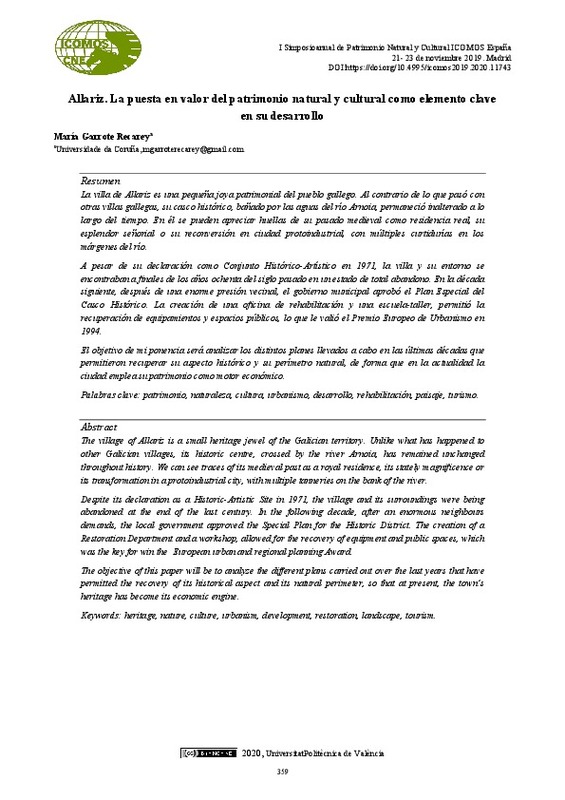JavaScript is disabled for your browser. Some features of this site may not work without it.
Buscar en RiuNet
Listar
Mi cuenta
Estadísticas
Ayuda RiuNet
Admin. UPV
Allariz. La puesta en valor del patrimonio natural y cultural como elemento clave en su desarrollo
Mostrar el registro completo del ítem
Garrote Recarey, M. (2021). Allariz. La puesta en valor del patrimonio natural y cultural como elemento clave en su desarrollo. En I Simposio anual de Patrimonio Natural y Cultural ICOMOS España. Editorial Universitat Politècnica de València. 359-366. https://doi.org/10.4995/icomos2019.2020.11743
Por favor, use este identificador para citar o enlazar este ítem: http://hdl.handle.net/10251/160466
Ficheros en el ítem
Metadatos del ítem
| Título: | Allariz. La puesta en valor del patrimonio natural y cultural como elemento clave en su desarrollo | |
| Autor: | Garrote Recarey, María | |
| Fecha difusión: |
|
|
| Resumen: |
[EN] The village of Allariz is a small heritage jewel of the Galician territory. Unlike what has happened to
other Galician villages, its historic centre, crossed by the river Arnoia, has remained unchanged
throughout ...[+]
[ES] La villa de Allariz es una pequeña joya patrimonial del pueblo gallego. Al contrario de lo que pasó con otras villas gallegas, su casco histórico, bañado por las aguas del río Arnoia, permaneció inalterado a lo largo ...[+]
|
|
| Palabras clave: |
|
|
| Derechos de uso: | Reserva de todos los derechos | |
| ISBN: |
|
|
| Fuente: |
|
|
| DOI: |
|
|
| Editorial: |
|
|
| Versión del editor: | http://ocs.editorial.upv.es/index.php/icomos_es/icomos2019/paper/view/11743 | |
| Título del congreso: |
|
|
| Lugar del congreso: |
|
|
| Fecha congreso: |
|
|
| Tipo: |
|








